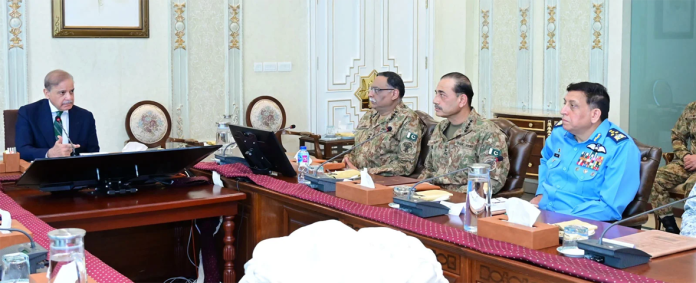ISLAMABAD, APR 24 (DNA): In a major development, the National Security Committee (NSC) has warned that any move by India to divert the flow of water, lawfully belonging to Pakistan, will be considered an act of war.
The warning was issued in a strongly worded communiqué following a high-level NSC — the top civil-military decision-making body — meeting chaired by Prime Minister Shehbaz Sharif on Thursday.
The NSC categorically rejected India’s unilateral decision to suspend the Indus Waters Treaty, calling the agreement vital for regional stability. It emphasised that water is a crucial national interest and the lifeline for 240 million Pakistanis, affirming Pakistan’s unwavering commitment to protect its water rights at all costs.
“If the flow of water owned by Pakistan is blocked or diverted, it will be deemed a declaration of war,” the NSC stated.
The statement also noted that India’s behaviour is reckless and irresponsible behaviour of India, which disregards international conventions, UN Security Council Resolutions and international obligations at will.
The meeting comes against the backdrop of Indian Prime Minister Narendra Modi-led government’s decision to suspend the Indus Water Treaty and ban the entry of Pakistani nationals after 26 tourists were gunned down in Indian Illegally Occupied Jammu and Kashmir’s (IIOJK) Pahalgam.
As part of its immediate response, the government announced the restriction of the Indian High Commission’s diplomatic staff in Islamabad to a maximum of 30 personnel, effective April 30.
Additionally, Pakistan has closed its airspace to all Indian-owned or operated flights with immediate effect.
The committee also decided to suspend all forms of trade with India, including those routed through third countries. Furthermore, it announced the immediate closure of the Wagah Border crossing.
The NSC vowed that Pakistan would respond to India’s hostile actions with full national strength, declaring that the nation and its armed forces are fully prepared to counter any form of aggression.
The communiqué also noted that India’s actions validate the Two-Nation Theory and confirm the apprehensions expressed by Quaid-e-Azam Muhammad Ali Jinnah. Despite the provocations, the NSC reaffirmed that the people of Pakistan remain committed to peace.
Islamabad’s response comes after India’s Ministry of External Affairs (MEA) laid out five measures which New Delhi has termed as “decisive response to cross-border terrorism”.
The Indus Water Treaty is a water-sharing agreement between Pakistan and India, facilitated by the World Bank. It gives India control over the three eastern rivers (Ravi, Beas and Sutlej) of the Indus basin while it gives Pakistan authority over the three western rivers (Indus, Jhelum and Chenab).
The other measures include the immediate closure of the Integrated Check Post Attari as well as the issuance of a deadline for Pakistanis to leave the country before May 1, 2025.
Also, Pakistani nationals will not be permitted to travel to India under the SAARC Visa Exemption Scheme (SVES) and any SVES visas issued in the past to Pakistani nationals are now deemed cancelled,
Any Pakistani national currently in India under an SVES visa has 48 hours to leave India.
Declaring military, naval and air advisers in the Pakistani High Commission in New Delhi persona non grata, India has asked them to leave the country within a week while also announcing to withdraw its own defence advisors from the Indian High Commission in Islamabad.
New Delhi will also be reducing its overall strength of the High Commissions to 30 from the present 55 by May 1.
Expanding on the situation, Defence Minister Khawaja Asif said the issues raised by India would be discussed in the NSC meeting today.
Speaking in the Geo News programme “Aaj Shahzeb Khanzada Kay Sath”, Asif noted that India couldn’t not unilaterally suspend the Indus Waters Treaty, as the agreement involves not just the two countries, but other stakeholders as well, including the World Bank.
He further added that India has long sought to exit the treaty, but Pakistan remains prepared to respond with full force if necessary.
Separately, speaking to the media, the defence minister said that Pakistan has absolutely nothing to do with it, as Pakistan rejects terrorism in all its forms and everywhere.
“This is all home-grown, there are revolutions in different so-called states against India, not one, not two, but dozens, from Nagaland to Kashmir, in the Khwahsciouth, in Chattisgarh, in Manipur. In all these places, there are revolutions against the Indian government,” he remarked.
Asif said that India should investigate the Pahalgam incident as merely levelling allegations won’t absolve them of responsibility.
“India’s allegation against Pakistan for the Pahalgam incident is inappropriate,” he said, adding that Pakistan is the most affected country by terrorism and has been facing the menace for decades.
“There should be no ambiguity that we strongly condemn terrorism,” the defence czar said; however, he added that a “false flag operation” could not be ruled out.
The defence czar’s concerns regarding a false flag operation have also been echoed by various defence analysts.
Brigadier (retd) Rashid Wali, while talking to Geo News, raised questions about India’s approach, noting that propaganda against Pakistan started doing the rounds almost immediately after the attack, with Indian media spreading baseless claims.
Former senator, Mushahid Hussain Syed, who is also a veteran foreign affairs expert, condemned India’s practice of jumping to blaming Pakistan following terror incidents in India or IIOJK.
The scepticism is to be taken in the context of India’s newsrooms resorting to war-mongering coupled with social media trends advocating for retaliation against Pakistan.
Account blocked
In the wake of the Pahalgam attack, the Indian government has also blocked the official X (formerly Twitter) account of the Government of Pakistan within its territory.
The account now displays a message stating it has been withheld in India in response to a legal demand.
Meanwhile, in a statement, Pakistan Peoples Party Parliamentarians’ (PPPP) spokesperson Shazia Marri strongly condemned the Pahalgam incident and India’s subsequent reaction.
She urged India to move past its “Pakistan phobia” and learn to respect international diplomacy. “Instead of placing blame over the killing of unarmed civilians, India should have conducted a proper investigation,” she added.
Marri emphasised that Pakistan is a responsible and strong nation, fully capable of responding to Indian aggression. “India has made a habit of spreading false propaganda against Pakistan,” she said, expressing astonishment over New Delhi’s allegations in the absence of any evidence.
She accused the Modi government of fuelling hatred within India and now pursuing the same approach against Pakistan. “The Modi regime should reflect on the oppression and brutality it has inflicted in occupied Kashmir,” Marri remarked.
She said that instead of levelling baseless accusations, India should examine its own security failures. “This month alone, Pakistan warmly welcomed over 6,700 Sikh pilgrims from India,” she pointed out.
“We desire improved relations between the two neighbouring countries, but India’s intentions do not appear sincere,” she said. “India has been embarrassed by its own bluster in the past — this time will be no different”.
Condemning India’s unilateral suspension of the Indus Waters Treaty, Marri said: “This is a blatant violation of international law. Such agreements cannot be suspended at the whim of one party”.
She asserted that Pakistan would fight its case at international forums over violations of the treaty and India’s water aggression. “Even during times of war, such treaties are not suspended,” she noted.
“The international community must take notice of India’s attempts to monopolise rivers, construct dams, and violate the Indus Waters Treaty,” she stressed, warning that New Delhi’s actions pose a serious threat to Pakistan’s water security and national sovereignty.
“In this struggle for Pakistan’s survival, every citizen understands their responsibility,” Marri said, adding that the Pakistani nation stands united with its armed forces to defend the country’s integrity.
She concluded by stating that Pakistan is actively informing the international media about India’s stubbornness and aggression.
False flag operation: AJK President
President of Azad Jammu and Kashmir (AJK), Barrister Sultan Mehmood Chaudhry, has said that the Modi government is gripped by a war frenzy, accusing India of staging a false flag operation in Pahalgam.
Condemning the Pahalgam incident, Barrister Chaudhry said India is levelling baseless allegations against Pakistan in an attempt to cover up its own crimes.
He alleged that India, under the Modi regime, orchestrated the Pahalgam drama and has also been involved in terror activities in countries including Canada.
Meanwhile, former AJK prime minister Raja Farooq Haider Khan stated that Indian involvement in the incident in occupied Kashmir is evident. He warned that any adventurism against Azad Kashmir would have consequences for India.
Furthermore, the spiritual leader of the Hur Jamaat, Pir Pagara, said that in these testing times, the entire nation and the Hur Jamaat stand firmly with Pakistan’s armed forces.
In a statement, Pir Pagara remarked that divisive political matters can be addressed later. “This is not a time for politics, but a moment to prioritise Pakistan’s defence and security. The defence of the motherland comes above all else,” he said.
He reiterated that at this critical juncture, the nation and the Hur Jamaat are united in support of the armed forces.
Separately, Jamaat-e-Islami chief Hafiz Naeemur Rehman said that India itself is behind the Pahalgam incident. “This is part of its conspiracy, and the government must issue a strong response to India’s actions,” he stated.
Additionally, the Pakistan Business Forum has called on the government to immediately suspend the Pakistan-India Joint Business Council. In a statement, the Forum declared that the entire business community of the country stands firmly with the Pakistan Armed Forces.
The forum also announced that it will now boycott the Indian business community at all levels. It criticised the idea of suspending the Indus Waters Treaty, calling it “ridiculous.”
Additionally, the forum urged the Ministry of Commerce to suspend all agreements with the Indian Chambers of Commerce.
It also called on customs authorities to ensure that Indian goods imported from the Middle East are returned to their origin.
Finally, the Pakistan Business Forum issued a directive to all trade organisations, advising them not to participate in any SAARC meetings until further notice.
Call for Indian diplomats’ expulsion
The Supreme Court Bar Association has demanded that Indian diplomats be ordered to leave the country within 48 hours. The association has called for these diplomats to be declared as “persona non grata” and instructed to depart within the specified time frame.
The SCBA’s President, Mian Rauf, stated that they are aware of the diplomatic tensions arising from the Pahalgam incident and emphasised that a firm and effective response is essential to safeguard national dignity.
He further said that the allegations against Pakistan by India are a bundle of absurd lies, completely unfounded. The Pahalgam incident, he added, is a failed attempt to conceal Indian atrocities in occupied Kashmir.
Under the patronage of the Indian military, fundamental rights are being violated in occupied Kashmir, and India aims to divert attention from the war crimes being committed in the region.

















